Sure of what you hope for and certain of what you do not see
Before you embark on a protest march on a day that is bitterly cold – 18 degrees Fahrenheit with a gusty wind – you take stock and prepare yourself. As walkers of all ages assemble in the fellowship hall, you greet old friends, meet new ones, and debate whether or not you’ll really need those two layers of long underwear when you head outside (you will).
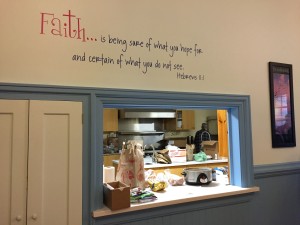
Even more important, you recall your intention. You recollect the yearning that drew you today to a small church in a small hill-town of western Massachusetts. You’re here to commemorate Rev. Dr. Martin Luther King, Jr., by walking a section of a proposed pipeline. Along with scores of other hardy souls, you’ll be tracing part of the route of Northeast Energy Direct (NED), a 400-plus-mile gas pipeline that would cut through Pennsylvania, New York, Connecticut, Massachusetts, and New Hampshire. The project is backed by Tennessee Gas Pipeline, a subsidiary of Kinder Morgan, and today is the last day of a 3-day trek to oppose it.
Give me a North Star before I set out on a journey! Give me a destination and the desire to reach it! There it is on the wall above me – a line from the Bible in big bold letters: “Faith is being sure of what you hope for and certain of what you do not see” (Hebrews 11:1).
I’m sure of what I hope for: a peaceful, just, and holy world.
I’m certain of what I do not see: an abiding Love that fills all things.
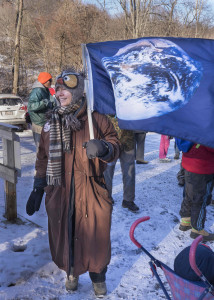
Faith is what fills me and what sends me out to contribute what I can. So here I am on a wintry morning, along with scores of men, women, and children, impelled by faith to take action on behalf of God’s good Earth and all her creatures.
People oppose the Kinder Morgan pipeline for all kinds of reasons. For starters, it would pass through some of our region’s most environmentally sensitive areas; threaten the purity of aquifers and the quality of public drinking water; disrupt lands legally committed to being conserved in perpetuity; and allow the company to seize public and private land by eminent domain. What’s more, it would further commit the Commonwealth of Massachusetts to reliance on a dirty source of energy; delay the urgently needed transition to clean renewable energy; and condemn the world to additional climate change, because methane, which is released during the production and distribution of natural gas, is a potent greenhouse gas that damages the climate. Many good alternatives exist, and our state’s Attorney General has concluded that this fracked gas pipeline is entirely unnecessary. (For details, visit NoFrackedGasInMass.org and Pipeline Awareness Network for the North East, Inc.)
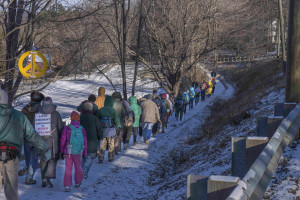
Photo @ Robert Jonas, 2016
After the marchers have put away their coffee cups and chairs, gathered in a circle, and given their names and hometowns, I offer an impromptu prayer. Someone shares a glorious, heartfelt song. Then we grab our coats, pick up our banners and signs, and head out the door, into the bracing cold wind.
I am amazed to discover that people have come not only from nearby towns such as Ashfield, Conway, Greenfield, and Shutesbury, but also from as far away as Connecticut, New Jersey, and North Carolina. Several members of Beyond Extreme Energy traveled a distance to join us, eager to stop all new permits for fossil fuel infrastructure and to advocate for clean, safe, renewable energy.
The last time I spoke with Ted Glick and other leaders of Beyond Extreme Energy was when I ran into them in DC during the Pope’s visit to the United States. At that point the BXE folks were deep into an 18-day, water-only fast in front of the headquarters of FERC, the Federal Energy Regulatory Commission. FERC is the agency charged with issuing permits for new fossil fuel infrastructure, and, as the BXE Website explains, “For years citizens groups have utilized FERC’s procedures to try to prevent the dramatic expansion of gas pipelines, compressor stations, storage terminals and export terminals.” None of these efforts have yielded anything: FERC remains intransigent, functioning, in effect, like a rubber stamp to the gas industry. In fact, this week environmental groups in Massachusetts are among 165 groups nationwide that are calling for a federal investigation into FERC, which they decry as a “rogue agency that is blatantly biased towards the pipeline companies it purports to regulate.” FERC no longer serves the common good.
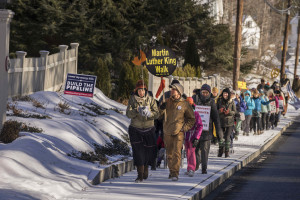
Photo © Robert jonas, 2016
It was FERC’s intransigence that led BXE members to start the Fast for No New Permits. Their Website describes the personal faith that motivated some of them to fast, and it quotes a man of faith, Pope Francis. In the words of his encyclical, Laudato Si: On Care for Our Common Home: “It is no longer enough, then, simply to state that we should be concerned for future generations. We need to see that what is at stake is our own dignity. Leaving an inhabitable planet to future generations is, first and foremost, up to us. The issue is one which dramatically affects us, for it has to do with the ultimate meaning of our earthly sojourn.”
It is good to walk beside Ted Glick, good to be walking with others who hold fast to the possibility of creating a better future. It is good to do what we can within legal limits: to file petitions, speak at public hearings, lobby politicians, organize demonstrations, and vote wisely. Just last week I filed a motion for “intervenor” status on behalf of our diocese’s Social Justice Commission, which would give us the right to participate in hearings, file briefs, and challenge FERC decisions.
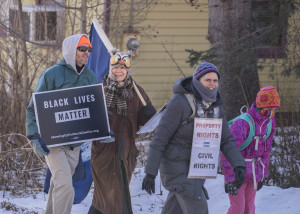
But the day may come – in fact, for some people of faith, that day is already here – when we realize that fasting and prayer, voting and vigils aren’t nearly enough to slow the climate crisis. More radical action, such as non-violent civil disobedience, is necessary. A week of global action is being planned for May 7-15, 2016. As Martin Luther King, Jr., once said, “We’ve played havoc with the destiny of the world… Somewhere we must make it clear that we are concerned about the survival of the world.”
We don’t know if we will be successful, even if “success” is defined, in very basic terms, as preserving human civilization and preserving a habitable world. 2015 was the hottest year in recorded history, and 2016 looks likely to be even hotter than that. But it’s not the certainty of success that propels us – it’s the certainty of faith. We are sure of what we hope for and certain of what we do not see. So we step out in faith, risking our comfort and maybe much more. To quote Dr. King one last time, “Faith is taking the first step even when you don’t see the whole staircase.”

9 Responses to “Sure of what you hope for and certain of what you do not see”
Judy Eiseman
Beautifully and forcefully stated, Margaret. I’ve long since come to the conclusion that more radical action is necessary while I hope for many interdependent outcomes–I’m clear on my hopes. For many years the hope, along with the conviction I could make a difference through individual action, sustained my efforts. At last I really see the need for a community of like minds to strengthen my faith that it can be done. I’m beginning to see the top of the staircase I guess.
Steven Norris
Thanks Margaret for this thoughtful, moving and wise account. We of BXE were greatly inspired last weekend by meeting and working with you and other Marchers from Massachusetts, and look forward eagerly to joining with you more in the future. Together we can make the earth safe for future generations. Steve
Ted Glick
Thank you, Margaret, for a moving and wonderful piece. It was good to be with you on the march.
Maggie Henry
Very moving! Wish I wasn’t so incapacitated by things in Pennsylvania, namely my gas refugee status and abandoning our farm. I would have loved to have been there! Please keep the pressure on!
Lise Olney
Thank you, Margaret–as the urgency to act grows, so does the need to so beautifully articulate it.
Danny Shanahan
Margaret,
“In wilderness is the preservation of the world,” said Henry David Thoreau. And your voice and the voice of many others speak and sings for the very earth we depend upon for our survival. I pray that F E R C and all this who are blind, see. And all those who cannot now hear, hear and understand and may they be healed of resistance and ignorance and inspired to love and act as you do.
norma akamatsu
Thank you, Margaret, for your heartfelt, authentic and inspiring call to action.
Identifying the principles and emotions that motivate you ask us all to consider what most matters.
Pipeline Perambulations | PopularResistance.Org
[…] article discussing this is written by The Rev. Margaret Bullitt-Jonas on Reviving Creation, Sure of what you hope for and certain of what you do not see. We can’t print all the articles. The photos on this page come from her website and were all […]
Chris and Karen Chase
Thank you for your inspiring words! We are residents of Northfield, MA and Brookline, MA and have been involved in this struggle for the last 2 years. As many know, Northfield is directly in the cross hairs of the NED pipeline. Not many in the eastern part of our state are aware of the struggle to preserve the integrity of the environment and to prevent toxic harm to the water and the earth in Western MA. There is much farmland and community life that will be destroyed if FERC approves this pipeline. Hopefully, your call to action will spread. And those who have been ignoring this clear and present danger will stand up for clean energy policies and work to stop the process for permitting the development for dirty fracked gas pipelines. We remain committed to stopping this madness both locally and globally. Our faith compels us.